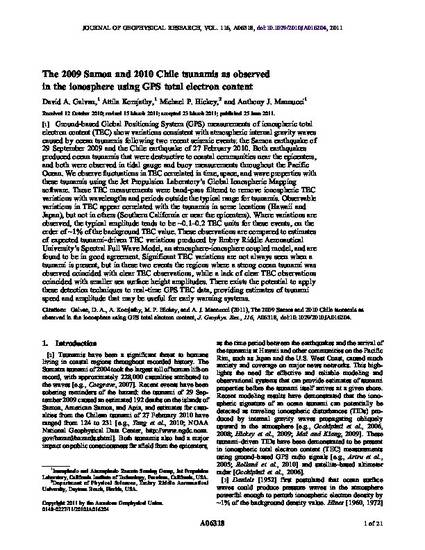
Ground‐based Global Positioning System (GPS) measurements of ionospheric total electron content (TEC) show variations consistent with atmospheric internal gravity waves caused by ocean tsunamis following two recent seismic events: the Samoa earthquake of 29 September 2009 and the Chile earthquake of 27 February 2010. Both earthquakes produced ocean tsunamis that were destructive to coastal communities near the epicenters, and both were observed in tidal gauge and buoy measurements throughout the Pacific Ocean. We observe fluctuations in TEC correlated in time, space, and wave properties with these tsunamis using the Jet Propulsion Laboratory’s Global Ionospheric Mapping software. These TEC measurements were band‐pass filtered to remove ionospheric TEC variations with wavelengths and periods outside the typical range for tsunamis. Observable variations in TEC appear correlated with the tsunamis in some locations (Hawaii and Japan), but not in others (Southern California or near the epicenters). Where variations are observed, the typical amplitude tends to be ∼0.1–0.2 TEC units for these events, on the order of ∼1% of the background TEC value. These observations are compared to estimates of expected tsunami‐driven TEC variations produced by Embry Riddle Aeronautical University’s Spectral Full Wave Model, an atmosphere‐ionosphere coupled model, and are found to be in good agreement. Significant TEC variations are not always seen when a tsunami is present, but in these two events the regions where a strong ocean tsunami was observed coincided with clear TEC observations, while a lack of clear TEC observations coincided with smaller sea surface height amplitudes. There exists the potential to apply these detection techniques to real‐time GPS TEC data, providing estimates of tsunami speed and amplitude that may be useful for early warning systems.
